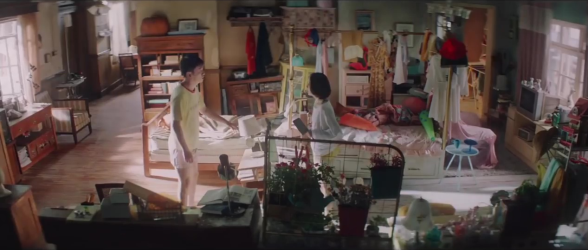It’s an oddity that The Boy and I will see 120 to 150 movies (or more!) a year and yet only half of those will be in the top 40. The percentage goes up slightly, however, when you factor in Asian films. This year Detective Chinatown 2 (#6) was one of our favorites, and we really wanted to see Operation Red Sea (#5) but we couldn’t work it out scheduling-wise. Then there’s this film, floating around at #30: A time-traveling romantic comedy called How Long Will I Love U.

It’s a corker of a question! How love will I love “u”, or “v” or “w” for that matter?
The Japanese love this kind of thing (last year’s romantic-comedy anime Your Name mixed time travel with body swap, for example), and this year’s Be With You adds a strong family element (also based on a Japanese novel which was made into a movie in 2004). Then there’s Shed Skin Papa, which is yet another Chinese familial time travel story based on a Japanese play.
Practice makes perfect, I guess, because this is one of those movies that’s a sort of sweet, dopey romance that turns action thriller at the end. And, once again, we see how easy it is to lose one’s soul in the pursuit of wealth. It’s both true and propaganda.

It’s at moments like these that I remember Lucasfilms added Kelly Marie Tran to “The Last Jedi” to appeal to the Asian market—and then frumped her up, I guess because the “Asian” checkbox was supposed to trump beauty.
In the year 2018, a woman, Xiao, discovers her apartment has merged with an older version of itself from 1999, when it was occupied by a single young man, Lu, aspiring to be a civil engineer but struggling with a corrupt boss. The woman is a status climber and gold digger of the worst sort, and she has no interest in the young man, except for using him as a prop to convince her school pals who married well that she also married well. Xiao, played by Liya Tong (who is the love interest in Chinatown Detective and has a cute cameo at the end of the sequel), just about borders on the despicable. There is a definite Chinese “type” we’ve seen in these films: The very haughty, shrewish, demanding female who finds fault with everything. And Tong plays this right at the edge of unlikability. Even beyond that edge, really.
I have always maintained that playing a bitch is the trickiest role for an actress. If she’s just straight up bitchy, she’s going to be unpleasant to watch, and that isn’t fun even if it’s true to some real world model. The trick is to be bitchy and somehow compelling, like Vivien Leigh in Gone With The Wind.

He’s confused. She’s combative.
Tong manages it, at least long enough for us to get a feel for her history, which took a dark turn into poverty when her father died in a drunk driving accident. This seems to have turned into an increasingly grasping and desperate woman, who only begins to get interested in her time-traveling roommate when it becomes clear that the modern version of him is wildly successful.
On the flip side you have Lu, who is basically a wimpy dreamer. Talented, probably, but harangued at work by a bullying boss and increasingly at home by his time-traveling roommate, both leading him down a bad path. Again, this is a terribly hard role to play without it being uncomfortable to watch, but much like Tong, Jiayin Lei pulls it off. We end up liking him and wanting things to work out for him, and hoping he does the right thing. Furthermore, we know what that is when, empowered by the love of this new girl, he becomes supremely confident in his future success and starts telling the right people off.
But this is where it gets complicated, and I won’t get into too many details because it’s a good one to watch unravel: It becomes increasingly clear that the present Lu is really not a nice person. Not a good person, even. He’s cold, he’s calculating, and he figures out what’s going on—there’s a preposterous and irrelevant sci-fi hook here that “explains” everything—to come after Xiao, and to make sure that his past self takes the exact same path he did.
Then things get dark and scary. Because, you know, Asian films. They do that. It’s not quite as dark as Your Name but it’s pretty close.
It’s terrific fun on a lot of levels. Once again I note that the Asian films do not have anywhere near American levels of CGI tech. And yet, they’re better at it than we are. This, I believe, is because they’re looking to make an artistic statement, not a realistic one. The merging of the two apartments is also done with a lot of practical effects and wonderful, wonderful set design. We loved it.

It’s not subtle, but it’s effective and aesthetic.
I loved this movie. The Boy found it a little alienating at the beginning because there’s a bunch of 1999/2018 time travel jokes, and they are very specific to Chinese culture. There’s a fish market joke that we didn’t really get (I could sort of guess at it) that basically brought down the house. By the end, though, we were both very pleased, however.
It’s increasingly hard to get us to American movies, really, unless they’re classics.
